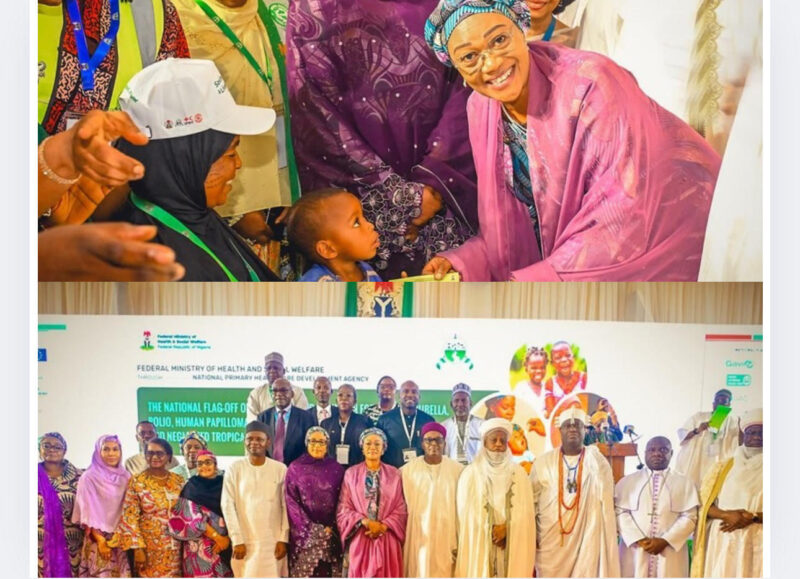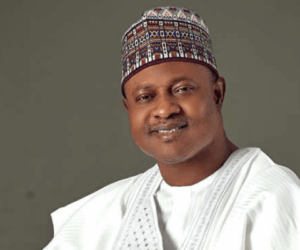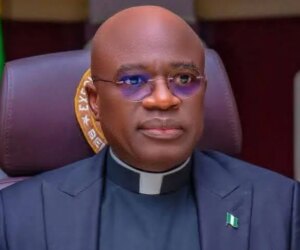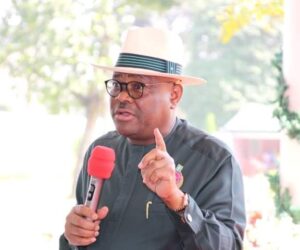• As education minister warns sanctions awaits saboteurs
• I mistook killer disease rubella as award – Ooni
• Sultan urges advocacy not force for successful campaign
From Juliana Taiwo-Obalonye, Abuja
In a remarkable show of commitment to child health and national progress, First Lady of Nigeria, Oluremi Tinubu on Monday officially launched the much-anticipated Measles-Rubella Vaccine Introduction Integrated Campaign at the State House Conference Center, Abuja.
This integrated campaign marks the largest health initiative in Africa’s history aimed at immunising millions of children and adolescents against measles, rubella, and other vaccine-preventable diseases.
Addressing attendees at the National Flag-off ceremony, the First Lady said the campaign is “a bold step towards protecting the lives and the future of our children,” emphasising that this flag-off signals a collective national resolve to end the devastation caused by measles and rubella. “These diseases steal the future of our sons and daughters,” she said. “Measles can cause blindness, permanent disability, and in too many cases, death. Its twin disease, rubella, though often silent, is equally harmful, especially to unborn children of infected pregnant women who may be born with blindness, deafness, or serious heart defects.”
The First Lady highlighted the profound consequences of these diseases, not only on families but on communities and the nation itself, calling them “a dream cut short” and a “future dimmed.” She urged Nigerians to embrace the vaccine wholeheartedly, stressing that “a vaccine in a vial does not save a child. A vaccine in a clinic does not protect a community. Protection only becomes real when that vaccine is injected into the arm of a child.”
Calling on the entire nation to support this campaign, the First Lady pleaded: “Mothers, take your children to be vaccinated. Fathers, support your wives and families to ensure your children are protected. To our revered traditional rulers and religious leaders, your voices carry immense weight—use your influence to spread the truth, dispel rumours, and ensure no child is left behind.”
She expressed appreciation for the pivotal roles traditional and religious leaders played in the successful rollout of the HPV vaccine.
The First Lady reaffirmed her commitment to advocating for increased vaccine uptake nationwide, partnering with state First Ladies, local government chairmen’s wives, women’s groups, and community leaders to guarantee “no child is left unprotected.”
In a nod to the collaborative efforts behind the initiative, she commended the Federal Ministry of Health and Social Welfare led by Muhammad Ali Pate, and the Executive Director of the National Primary Health Care Development Agency (NPHCDA), Dr. Muyi Aina. She also recognised the critical support of partners including the World Health Organization, UNICEF, the Gates Foundation, and Gavi, pointing out that the campaign aligns with President Bola Tinubu’s Renewed Hope Agenda, which prioritizes a healthy start for every Nigerian child and the elimination of maternal mortality.
“These vaccines are safe, effective, and free,” Senator Tinubu emphasised. “They are among the greatest gifts of modern medicine, saving lives, preventing disease, and allowing our children the chance to grow, learn, and thrive.”
Following her remarks, the First Lady officially flagged off the campaign, setting into motion a nationwide drive expected to reach approximately 106 million children aged 9 months to under 15 years in two phases. The campaign also integrates vaccination efforts against polio and the rollout of the HPV vaccine among adolescent girls, combining resources to optimise health impact.
Mrs. Tinubu concluded her address with an invocation of blessings on children, mothers, and the nation, stating, “God bless our Children. God bless our Mothers. God bless the Federal Republic of Nigeria.”
Coordinating Minister of Health and Social Welfare, Ali Pate, described the campaign as a historic milestone for Nigeria’s health system.
He explained that the campaign is not just about administering vaccines but represents a new approach to delivering health services directly to the people, ensuring inclusivity and leaving no one behind.
He added that the campaign aims to reach approximately 100 million children and adolescents nationwide, making it one of Nigeria’s largest public health undertakings. Initially focused on measles and rubella, the campaign has expanded to integrate vaccines for polio, HPV, routine immunisations, and treatments for neglected tropical diseases such as river blindness and lymphatic filariasis. This strategic integration, he added reduces duplication, optimises resources, and targets underserved rural and hard-to-reach communities.
Pate hailed the First Lady’s dedicated leadership, personal investment, and advocacy in key health areas including tuberculosis, HPV vaccination, and the elimination of mother-to-child transmission of HIV, syphilis, and hepatitis.
Highlighting achievements under the President’s vision, the Minister announced substantial growth in primary health care utilization—from 10 million visits per quarter in 2023 to 47 million in mid-2025—and the planned expansion of fully functional primary health centers by 4,800 by the end of the year. Additionally, thousands of pregnant women have benefited from targeted maternal health programs supported by the President’s initiatives.
Acknowledging the critical role of state and local governments, traditional and religious leaders, and an extensive network of health workers, Pate called for continued collaboration and accountability. He urged parents to ensure their children receive vaccines, debunking misinformation and emphasizing vaccine safety and effectiveness.
Pate concluded with a call to action for all stakeholders to work together to sustain Nigeria’s health system transformation and secure a healthier future for the nation’s children and families.
Also speaking Minister of Education, Olatunji Alausa, warned that sanctions would be imposed on school administrators who sabotage the government’s vaccination efforts by shutting out vaccinators from schools.
Represented by Deputy Director in the ministry, Peter Ojonuba, he described the campaign as not just a vaccination drive but a critical investment in Nigeria’s future and educational progress, saying, “It is a day to ignite hope for healthier children, stronger communities, and a bright future for our beloved Nigeria.”
He stressed the grave threats posed by measles, one of the leading causes of vaccine-preventable deaths in children under five, and rubella, which can cause lifelong disabilities when contracted during pregnancy.
Stressing the linkage between health and education, the Minister noted, “A child who is sick cannot attend school. A healthy child is a teachable child. Illnesses like measles and rubella disrupt school attendance, impair cognitive development, and place undue burdens on families and the education system.”
He pledged the Ministry of Education’s full support, with schools as platforms for vaccination awareness and delivery.
Addressing potential obstructionists, Alausa stated firmly, “For those administrators who sabotage the efforts of government by shutting out vaccinators from educational settings, know that there are consequences.”
He urged parents and guardians to ensure their children receive the free, safe, and effective vaccine, saying, “To parents and guardians: take advantage of this opportunity. Ensure your children receive the measles-rubella vaccine.” He also called on teachers and school leaders to be champions of health and encouraged young people to be ambassadors of change.
The campaign, which targets children aged 9 months to 14 years, aligns with international best practices and Nigeria’s commitments under the Immunization Agenda 2030 and Sustainable Development Goals. It represents a bold national strategy to eliminate measles and rubella, improve school attendance, and secure the nation’s future.
Alausa concluded, “Let this campaign mark the beginning of a new era—where health and education walk hand in hand, where no child is left behind due to preventable illness, and where Nigeria stands tall as a beacon of integrated development.”
Deputy Director for Immunisation and Disease Control at the Gates Foundation Nigeria, Yusuf Yusufari, emphasised the resilience and progress of Nigeria’s immunisation journey.
He recalled that two years ago, Nigeria introduced the HPV vaccine into its routine immunisation programme at the same venue, led by First Lady, “Nigeria became a global exemplar in protecting young girls from cervical cancer,” he said, affirming that the campaign launched shares that same critical goal: “No child (and woman) in Nigeria, and indeed globally, should be left unprotected and left to die from preventable diseases.”
He invoked the visionary commitment of Bill Gates, who pledged $200 billion over the next 20 years to fight preventable diseases worldwide.
Yusufari highlighted Nigeria’s remarkable immunisation milestones, including its certification as free of wild poliovirus in 2020, a transition from a global epicenter to a success story. Routine immunisation coverage has notably increased from 33% in 2016 to more than 60% today, aided by the introduction of vaccines like pneumococcal, rotavirus, HPV, and now the measles-rubella vaccine, a landmark that prevents two deadly diseases simultaneously.
However, he was candid about ongoing challenges: “More than 2 million Nigerian children remain ‘zero-dose’—completely unprotected—the second highest number in the world.” These missed children continue to fuel outbreaks of measles and circulating vaccine-derived poliovirus type 2, underscoring an urgent gap that the campaign aims to close.
Detailing the scale of the 2025 Integrated Campaign, Yusufari explained that it is the largest in Nigeria’s history, targeting 106 million children across all 36 states and the Federal Capital Territory. In 21 states, children will receive both measles-rubella and polio vaccines during one visit, while in 4 states, additional services such as malaria nets and deworming tablets will also be provided. This integrated approach is designed to maximize resources, save caregivers’ time, and build trust in health services. “A mother can leave one clinic visit knowing her children are protected against measles, rubella, polio, and even malaria,” he said.
Reaffirming the Gates Foundation’s commitment, Yusufari called on all stakeholders to “Act Together”—aligning government, partners, and communities as one team; to “Reach Every Child”—closing the zero-dose gap with innovative outreach and technology; and to “Secure Nigeria’s Future” by strengthening primary health care systems to sustain these gains.
“If we succeed,” he concluded, “Nigeria will not only safeguard its children but inspire the world with what is possible. Together, let us act with urgency, unity, and persistence so that truly no child is left behind.”
Delivering a goodwill message on behalf of Gavi, the Vaccine Alliance, Senior Programme Manager for Nigeria, Tarcile Mballa, highlighted the historic partnership between Gavi and Nigeria that has spanned two decades with investments exceeding $2.6 billion. “We have witnessed immunization coverage rise from 27% in 2001 to 67% in 2024, a testament to collective commitment,” she said. Mballa stated Gavi’s contribution to the current campaign totals $103 million in operational support, vaccines, and technical assistance.
She emphasized the ambitious scope of the campaign, describing it as a convergence of “ambition and opportunity” with Nigeria leading public health innovation on the continent. Mballa referenced Nigeria’s recent successful rollout of the HPV vaccine, which has protected over 15 million girls from cervical cancer, as a strong precedent for the integrated approach. She noted the campaign’s complexity requires strong systems and “adaptive strategies,” highlighting Nigeria’s robust leadership and collaboration from federal to community levels.
“The establishment of real-time coordination platforms, strengthened community engagement, and rapid decision-making mechanisms will ensure every child and their caregiver are safely catered to,” Mballa affirmed.
The campaign is also backed by robust partnerships with global health organizations including the Gates Foundation, UNICEF, WHO, Africa CDC, and US CDC. According to Mballa, under the leadership of the National Primary Health Care Development Agency (NPHCDA), unified planning and innovative shared approaches have been critical.
Looking forward, she underscored the need for sustainable financing and enhancement of routine immunization to reduce large-scale campaigns in the future. “We applaud the recent approval of over a billion dollars for health sector reforms and $200 million dedicated to health systems,” she lauded, calling on federal and state governments to sustain fiscal commitments and accountability for vaccine delivery.
Mballa concluded by affirming Gavi’s dedication to supporting Nigeria to accelerate towards universal vaccine coverage and reduce zero-dose children. “This campaign’s success will not only transform immunization in Nigeria but serve as a beacon for other countries across Africa and beyond,” she stated.
On his part, the Ooni of Ife, Adeyeye Ogunwusi humorously revealed that he initially thought “rubella” was an award, not realising it was actually a serious disease threatening Nigerian children. The traditional ruler stressed the importance of protecting children’s health as a national priority.
Describing rubella, the Ooni said, “About a year ago, when the team of Dr Aina came to me, I thought rubella was a beautiful award they were bringing to traditional rulers, not knowing that it’s a disease. You look at the way it sounds — rubella — it sounds very positive, but it’s a killer disease.”
He praised the efforts of health officials and public officers for their dedication in sensitizing Nigerians about rubella and other deadly diseases. “We are all aware of measles, but I am very positive many here have never heard of rubella, like me. We must continue to create awareness throughout the country,” he said.
The Ooni expressed gratitude to the First Lady of Nigeria, for her relentless advocacy in health and education sectors. “We wish to thank you on behalf of all traditional rulers for everything you are doing for the country.” He urged the audience to give her a standing ovation for her efforts day and night in sectors like health and education.
Highlighting the vital role of mothers in the fight for child health, the Ooni called on all Nigerians to prioritise the wellbeing of children, calling them the “future of our country.”
He emphasised collective responsibility for national prosperity through healthy citizens, saying, “For any healthy citizens of any nation, that is the strength of the wealth of that nation. Let us continue to put the health and wellbeing of our children first.”
The Sultan of Sokoto, Alhaji Sa’ad Abubakar III, has emphasized that advocacy and education, rather than enforcement, will be crucial for Nigeria’s rubella vaccine campaign to succeed. Speaking at a recent national health event, he recalled the country’s successful polio eradication efforts, attributing it to community persuasion rather than coercion.
“We defeated polio not by force but by convincing people that the vaccine is safe,” the Sultan said. “We held seminars with religious leaders to educate communities and show that the vaccine is not anti-childbirth or harmful in any way.” He stressed the importance of ongoing education and the role of traditional and religious leaders in increasing vaccine acceptance.
The Sultan praised the commitment of the First Lady, describing her efforts across the nation as inspiring. “Her total commitment strengthens us, and we fully support government programs that advance the health of our nation,” he added.
Calling on all stakeholders, the Sultan urged, “Parents, caregivers, governors, and their wives must join hands to drive this campaign forward through positive advocacy, not force.” He expressed confidence that through this inclusive approach, Nigeria will achieve a healthier future for its children.
President of the Christian Association of Nigeria (CAN) President, Daniel Okoh, expressed profound support and optimism for the initiative aimed at protecting children and strengthening public health nationwide.
He described the campaign as a golden opportunity towards reducing preventable childhood deaths and strengthening public health in our nation.
Reflecting on earlier advocacy efforts, he recalled the meeting with the leadership of the Measles Rubella Coalition: “Earlier in the year, we received in audience the leadership of the coalition who paid a courtesy visit to me at the National Christian Center Abuja. At that visit, we promised to support this advocacy, and we have done so by mobilising the five major blocks of the Christian Association of Nigeria in readiness for the mass rollout of this vaccine anytime.”
Emphasising the link between health and national progress, Okoh stated, “We understand that the health of the people is central to national development; a healthy population is the foundation for productivity, innovation, and peace. This campaign therefore deserves our collective support from government, development partners, traditional institutions, civil societies, and of course, the church.”
He specifically commended the First Lady, for her leadership and commitment to the campaign, saying, “This is not the first time she’s doing it, and we recognise her commitment and passion in this cause. We pray that the Lord will continue to strengthen your hands.”
He urged parents, caregivers, and communities to ensure their children are vaccinated: “We call on parents, caregivers, and communities across Nigeria to take full advantage of this opportunity by ensuring that every eligible child is vaccinated and protected.”
He also encouraged member churches nationwide to play an active role in awareness and mobilization efforts. Concluding with a prayerful note, he said, “It is our prayer that this initiative will contribute to the emergence of a healthier, stronger, and more prosperous Nigeria.”
Dr. Muyi Aina earlier described the campaign as “the mother of all campaigns, the largest in the history of Africa,” underlining its significance in introducing the measles-rubella vaccine into Nigeria’s routine immunisation schedule and strengthening the fight against preventable diseases.
The campaign is supported by international partners including UNICEF, the Bill & Melinda Gates Foundation, Gavi, and the World Health Organization, all contributing technical and financial resources to support Nigeria’s progress towards universal health coverage and disease elimination goals.







